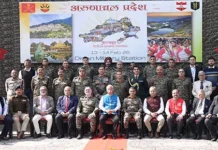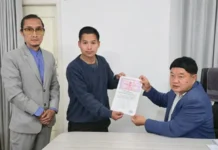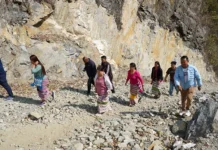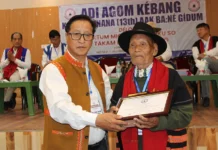[ Amar Sangno ]
ITANAGAR, 20 Sep: As September approaches, it excites every music aficionado and youth in the region and the country, prompting them to plan for the four-day-long Ziro Festival of Music or ZFM, in the heart of the Apatani plateau. The acronym has been a household name among indie music artists, as the festival is considered one of the best gatherings for music lovers.
This year, ZFM is celebrating its 10th anniversary. However, looking back, the region’s greatest indie music festival had a roller coaster ride to come this far. The partly department of tourism-funded festival was born out of casual conversation between curators Bobby Hano and Anup Kutty, which succeeded in making inroads among the hearts of music lovers and resonating with festival-goers.
The festival has successfully evolved despite challenges such as a paucity of funds compounded by two years of the ravaging Covid-19 pandemic.
“Our journey has been truly remarkable, marked by a blend of challenges and triumphs. The emotions that arise are understandable, given the sacrifices made – the loss of family members, internal team conflicts, and clashes of ideas with associates. Despite these hurdles, the sense of achievement in how far we’ve come is heartening,” said Bobby Hano, visibly content.
Marking a decade of cultural exchange, artistic expression, and a steadfast commitment to sustainability, the 10th installment of the Ziro Festival holds the promise of being a momentous occasion, Hano shared.
In Hano’s own words, the festival’s evolution into a significant cultural event underscores its ability to foster artistic exploration, cultural exchange, and a sense of belongingness. Hano divulged that the shared passion and support from various stakeholders have played a pivotal role in shaping this unique and thriving platform.
“Over the course of twelve years (including two years of Covid lockdown), the path we have treaded has been a roller coaster. Securing funds, repaying debts, and convincing people about the festival’s worth have all been part of this ride,” he added.
He attributed his team’s unyielding spirit, power of persistence, and determination that prevailed over the odds, saying giving up was never an option in the journey of determination.
“It’s truly remarkable to witness the growth and success of the Ziro Festival over the years. From uncertain beginnings to its 10th edition, the festival’s journey reflects the dedication of its team and the impact it has had on artists, musicians, and culture enthusiasts from around the world,” Hano said.
The festival curator said the international presence at the festival has flourished due to its distinctiveness and the openness of its attendees to new performances. The festival’s reputation as a platform for bands to connect with fresh audiences has contributed to its appeal.
ZFM got international support from cultural agencies like the British Council, Embassy of Israel, and Institut de Francais, which succeeded in fostering a fusion of Indian and international talents.
The improvements of infrastructure, such as the introduction of a train to Naharlagun, Hollongi Airport, and completion of the Potin to Ziro Trans-Arunachal Highway, have bolstered the festival, providing more convenient travel options for festival-goers.
“Reflecting on whether I would alter anything that transpired during that first year, I recognize that hindsight often fosters a desire for refinement. While we certainly encountered challenges and navigated unexpected hurdles, they proved instrumental for our development and education,” Hano shared.
He went on to divulge that the inaugural year served as a valuable schooling ground, granting them insights into the intricacies of orchestrating an event of such magnitude.
“Our journey has been one of continuous adaptation and enhancement as we moved forward. One of the most enduring memories from that first year is the overwhelming sense of community and unity that blossomed throughout the festival. This cohesion stood as a testament to the potent force of music and the capacity of an event like the Ziro Festival to unite people,” he added.
In its 10th edition, the ZFM unveils the Takvr Stage, an exciting new addition that will spotlight prominent DJs and music producers. Crafted under the guidance of Ziro Festival veteran and India’s foremost electronic artist, Sapta, also known as Marti Bharath, the Takvr stage is set to present an extraordinary lineup hailing from various corners of the globe.
This lineup features a dynamic array of homegrown talents such as Kissnuka, known by her real name Anushka Manchanda, Nagaland’s premier DJ and producer Ina, along with Deep Brown, Smokey Sound and Unnayana, among other notable names. The international roster includes renowned acts like Angata from Israel, Sebastian Fuchs from Germany, and the Lithuanian producer Leon Somov, who is making a return to Ziro this year.
Bollywood playback singer Mohit Chauhan and actor-producer and music composer Farhan Akhtar will also be performing with his band.
A decade into its fulfilling journey, ZFM, however, is no stranger to criticism; festival-goers and critics often complain about exorbitant ticket prices.
Being a partially government-funded festival, the critics argue that it should keep ticket prices reasonable.
“State government funding covers only a small fraction of the cost involved in making such a large-scale festival. Also, the funding is meant to help the festival become self-sustainable and create infrastructure that will attract tourism to the region. Producing a festival like Ziro Festival, which attracts artists and attendees from across the world, is no mean feat and requires enormous resources,” retorted Hano.
“Ziro Festival is an independent labor of love for music and indie artists. While all our artists and crew are fairly compensated, the challenging terrain and remote location make this a costly endeavor. The department of tourism funds covers only a fraction of the costs. We heavily rely on attendees’ support to keep the festival sustainable,” he defended.
He also argued that buying tickets directly supports them to ensure that they could bring top indie music and foster art and promote tourism in this unique region.
“By purchasing tickets, you’re not just gaining access to an incredible music experience; you’re investing in the growth and sustainability of Ziro Festival. Your support is crucial for us to thrive and continue this journey. Asking for a free pass is the opposite of all of this,” he said.
He further argued that despite all of these factors, the festival tickets still remain affordable in comparison to similar world-class music festivals. Also, the audience has been growing year after year, making this one of the most important events in northeast India.
Apart from cultural exchange and musical convergence, the festival has brought significant economic sustainability in terms of the hospitality (homestay) business among the Apatani tribe.
“ZFM has both pros and cons. Pros – we are proud that the most popular music festival is happening at Ziro and has put Ziro on the world tourist map. Secondly, it boosts the local economy. But we are apprehensive that it might encourage drug culture among youths because visitors are branding weeds in the venue of ZFM, which is alien to our culture,” said Taku Chatung, general secretary of Tanw Supuñ Dukuñ (TSD).
“We ask the management team of ZFM to promote ‘Zero Drugs Ziro’ (slogan of CBO of our society) through various multimedia platforms of ZFM so that our effort to fight drug menace may reach amongst youths,” Chatung said.
“Drawing from the wisdom of the hosting Apatani tribe, the Ziro Festival is meticulously designed around sustainable principles deeply ingrained in the community for generations.
“Among these principles is the utilization of repurposed bamboo, a locally abundant resource, and reusable oak and pine wood, skillfully crafted into structures. This commitment extends to upcycled and reusable cloth buntings and bamboo light fixtures for decorations,” Hano informed.
It is informed that each year, the local community collaborates closely with organizers to enhance the festival’s sustainability. They engage both governmental and private partners to implement fresh eco-friendly initiatives, building upon measures adopted in previous years.





